1983
Highlights of the year:
First ever game: London Ravens vs. Northwich Spartans
Ravens take on US Airforce
Teams struggle to find kit
First ever NFL game in Britain
During 1983, equipment was started to be ordered by desparate players in the UK. Books and videos were ordered, and Americans living in the UK was called on to give all the knowledge they had on the growing sport.
London was one of the early places for interest, along with Manchester. Teams started springing up around areas that had American air force bases in the nearby area - teams such as Milton Keynes and Northampton.
The National Football League had appointed an agency to look after sales of its merchandise since the late 1970's, and it reported back to the League on every kind of development, especially the crucial TV audience on Channel 4 which would begin at 750,000 in 1982 and rise to approaching 4,000,000 at it's peak.
In the summer of 1983, an English entrepeneur hiredout Wembley Stadium, and brought two NFL teams over (Minnesota Vikings vs. St. Louis Cardinals) to play an exhibition match in front of just over 30,000 fans. The event lost money, but this fixture at Wembley, was soon to become the annual American Bowl.
The London Ravens held training sessions in Hyde Park and attracted a huge number of prospective players. They played the first all-British game against the Northwich (soon to become Manchester) Spartans. The Ravens won 48-0 in October 1983.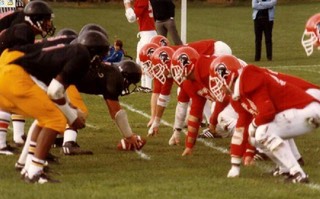
London Ravens (black shirts) lined up against Northwich Spartans in the UK's first ever game
1984
Throughout the winter of 1983-84 attempts were made to form a national league. At first that didn't seem possible, but in February 1984 at a meeting in the Post House Hotel, Bedford, representatives of 35 teams met to discuss the formation of an association. It was decided at that meeting to reconvene in two weeks time in London where, it was hoped, the first wheels would be set in motion.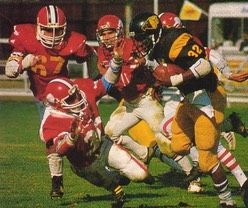
Ravens v Paris Spartcatus in 1984, Mark Walcott with the run
The Ravens then took on the US airforce base team from Chicksands in Bedfordshire. The Londoners made up for their lack of knowledge with a mixture of enthusiam and athletiscism. The Ravens lost both games against Chicksands - one played at Chelsea FC's Stamford Bridge. The first (when the Americans probably totally underestimated their unusual opposition) was by a score of just 8-0 - a very creditable result.
Official associations were now beginning to form, so that the sport could prepare for a league format. In 1984 there was no official structure, and games were played on a one-off basis. However, the various league associations that were to form would plan for league competition by 1985.
At that second meeting on March 3rd, not one but two leagues were formed. Twenty-six clubs attended and after a stormy debate seven clubs broke away to form the British American Football Federation (BAFF), with the remaining 19 becoming the American Football League United Kingdom (AFLUK). Such divisions would harm the sport for several years in the eyes of other sports administrators and ultimately the Sports Council.
As friendlies continued to be played throughout 1984, the two leagues began recruitment campaigns for the 1985 season in earnest and allowed the teams simply to get on with it organising matches against each other by simply ringing one another up and arranging a time and place.
The number of teams was growing faster than anyone could imagine. By the end of 1984 there would be approximately 40 teams fully kitted and playing. There were then probably another 20 who had only a few pads and helmets and were just waiting to start.
One of the major problems with the new teams were that although they were now getting equipment supplied without any real problems, the start-up money was having to come out of the players pockets. Everyone paid a weekly subs just for turning up for training and ultimately playing a game. It soon became clear that sponsorship would be necessary. The cost for a full set of equipment at this time was about £300 and the general expenses of running 50-man teams to games, to practises etc was too much to handle. So teams came and went after maybe only one game, many would go broke. Some never even made the field of play at all. Gone but not forgotten are squads like Tenbury Crusaders, Harrogate Bulldozers and the Medina Mustangs - they never actually got round to playing a game!
The best example of teams rising too quick is of the Poole Sharks. They were among the first teams in kit and were determined to push back the barriers of the British game. The Sharks played more than most in 1984 and even became the first team to travel abroad for a game when they decided to undertake a mammoth coach trip to take on the Dusseldorf Panthers, who were a team for in advance of any the Sharks had previously played.
They returned with a crushing 69-0 defeat and quite a few injuries, which was ultimately to put pay to their existence. However, as would happen so-often, the Sharks players managed to re-group and through various name and personnel changes (including the Dorset Broncos and the Wessex Wildcats) many of that team emerged as the Bournemouth Bobcats.
The London Ravens continued to lead with a Big Five group of clubs being picked out as ahead of the rest - the Ravens, the Manchester Spartans, Milton Keynes Bucks, Birmingham Bulls and the Northants Storm. The Ravens would win all ten games this year and lead the unofficial merit table of UK football published in December 1984 by GRIDIRON UK magazine (the first magazine to devote space to the British game). Milton Keynes were widely acknowledged as second best team in the country with a 10-2-0 record and losses only to the Londoners. The Ravens also took on foreign opposition for the first time and managed another win - 51-0 against top French team, the Paris Spartacus.
Some of the games in the summer of 84 received some surprisingly high attendances for such a new sport. A Milton Keynes/Northants encounter at the open-air Milton Keynes Bowl on a lovely summers day in June clocked up 7,000 fans. The Birmingham Bulls and the London Ravens also played out a fascinating two-game series, with the Ravens winning both games.
There was another game at Wembley in 1984, but instead of two NFL teams, the United States Football League (USFL) sent over the Tampa Bay Bandits and the Philadelphia Stars for a post-season challenge match. The crowd was down on the previous year, but showed further development.

http://www.youtube.com/watch?v=CD1QzIEJyhc
Towards the end of 1984, the various amateur leagues were close to readiness for a full season of organised games in 1985. AFL (UK) had virtually all the top teams behind it and more of the rest. BAFF had about a dozen which were largely concentrated in the south. It was no surprise that a meeting should be called to try and immediately put the leagues together in time for the 1985 season or at least form a governing body to head up the whole operation.
Mike Shepherd, a local Birmingham council official, met with AFLUK and BAFF teams in Birmingham's Digbeth Hall. This was the largest conference of its kind in the UK to that date and nearly all the teams were represented. The idea of a governing body was welcomed but failed to get established. With hindsight it was too early to develop a governing body at this stage, as most people involved at that time just wanted to be left alone to play the game. The two leagues could not resolve their , and instead of any sense of unity being achieved, a third league (the United Kingdom American Football Association) was born from that Birmingham meeting, with Shepherd as it's head. This league pledged to look after many of the starter teams.
1985
As the first organised leagues in the UK began to take shape in 1985, there were approximately 70 teams ready to play the inaugural season of British American football. A fourth league had now emerged which meant there were organisations that catered for all standards of teams in all regions of the UK. Their only problem was that they all acted individually.AAFC President - Geoff Hulse
AFL (UK) had retained the top clubs despite a close-season of rumours and their numbers were 35 in the league. BAFF handled 12 clubs, which were all fairly well established. The UKAFA league started with 15 very new clubs and the fourth league, the Amateur American Football Conference (AAFC), had a six team league of brand new clubs from Lancashire and Yorkshire.
In the AFL, crowds of 2,000 were not uncommon as the Ravens, Bulls and the Leicester Panthers emerged unbeaten from the regular season to win conference championships.
There was not, of course, success for every team. Tryers like Tyneside Trojans, King's Lynn Patriots, Wessex Wildcats, Southend Sabres, Staffordshire Stampeders and Newcastle Browns would all play this first season only to fold after their brave initial attempt to hold a position at the head of the sport.
In the AFL playoffs, the Ravens traveled to Leicester in one semi-final and won 40-14 in a classic encounter at Saffron Lane Stadium. The game took place on the same day that the Streatham Olympians caused the shock of the year by overcoming the favoured Birmingham Bulls 13-12 at Oxford City FC in the other semi.
Villa Park was the venue for the first ever British American football championship, and with the Birmingham Bulls failing to make the final in their home town, the organisers were suddenly struggling to make the event viable money wise. A sponsor had to be found, and up stepped City Sports and Leisure of Oxford to guarantee the expenses of the two London teams. The game attracted more than 7,000 fans to this historic event.
The underdog Olympians never recovered from the very first play - they fumbled the opening kickoff which the Ravens recovered. A Ravens TD soon followed and they went on to record their expected victory in Summer Bowl I - 45-7. Joe St.Louis, a London DJ, won the MVP award after a 70 yard run that left a trail of Olympian players in his wake.

Action from Summerbowl I - Streatham Olympians v. London Ravens
After two years of claiming to be the best, the Ravens had proved their point and could look forward to a place in the inaugural EuroBowl club championship in 1986. They never actually got to take part for reasons that would become apparent in the off-season.
Meanwhile, the other three associations completed their seasons with championships of their own. A month after SummerBowl I, the Rockingham Rebels (a splinter team from the Northants Stormbringers) won the BAFF title with a 13-0 win against the Croydon Coyotes; the Slough Silverbacks took the UKAFA trophy and Locomotive Derby were the victors in the AAFC Steel Bowl.
Gridiron in the UK continued into the autumn as Great Britain played its first international match - a friendly against France. The Brits, coached by the then Ravens head coach Lance Cone (see below), scored an early touchdown through another Raven Victor Ebubideke, but the expected drubbing never materialised and GB settled for a 7-0 victory. It was an important landmark as Great Britain was gaining a reputation as the up and coming power in Europe.
As the inaugural season closed, a company was rumoured to be preparing a major sponsorship of the British game. It soon became apparent that that company was Budweiser as it was announced that they had employed an international marketing company to work on a feasibility study.
The study persuaded Budweiser to make available an estimated £300,000 to cover all areas of the sport in Britain. Budweiser had approached a divided sport and could find no one to represent the whole of Britball as a fellow negotiator for their deal. Many of the AFL teams wanted to continue under their own banner and a merger between the two previously warring factions occurred when their executive joined forces with the BAFF to form a united front. This joint league became known as the British American Football League (BAFL) and stayed out of the Budweiser plan. The BAFL attracted 38 teams, many of whom had played with the two warring leagues in the previous season.
Budweiser, however, had made a commitment. In October 1985, Budweiser European Sales Director Harry Drnec declared defiantly,
"We are going to play football next year".
Budweiser held their first meeting a week later - an open event for anyone interested in football. Most of the country's top teams attended. When the London Ravens and Streatham Olympians announced their intentions to join Budweiser, a vicious war of words erupted that, at one stage, threatened the whole of UK football. The sport was in total disarray.
Budweiser appointed Chris Childs as its first commisioner, and with BAFL's Radcliffe Phillips as his opposite number embarked on a major propaganda campaign to attract teams to their rival organisations.
BAFL then received it's trump card when the EFL, the sports governing body in Europe, ruled that it would only recognise BAFL teams. The reason for this was that it's EFL membership had been negotiated under the AFL banner, and was transferred to BAFL at the time of the merger. The agreement meant that only BAFL teams or registered players could play other European teams. For a sport which was chomping at the bit to prove itself on a European level, this EFL agreement was a powerful advantage for the BAFL.
Open hostilities were declared when the Streatham Olympians were told that an attractive fixture against top German side Dusseldorf Panthers could not go ahead. The Olympians had already been snubbed once, in December, when Manchester Allstars took their place against a French team in Boulogne.
SJAFL (scottish Junior american football league) est 1985, first game Corstorphine Cougars vs Edinburgh Hawks on the meadows in Edinburgh sept 29th 1985, won 18-0 by the Cougars
Action from the first "touch" game in Scotland
Corstorphine Cougars v Edinburgh Hawks
Picture courtesy of Peter Laird
1986
As 1986 got underway, both leagues started to organise fixtures. One thing had to be resolved - which team would represent Great Britain in the inaugural EuroBowl club championship? The Ravens had won the AFL title in 1985 and hence the right to appear. However, BAFL's EFL membership meant one of it's own teams would take the EuroBowl spot. Both the Ravens and the Budweiser League appealed to the EFL to change it's mind, but the European officials sided with their original partner and judged that a BAFL team should travel to the Netherlands for the championships. The two semi-finalists from the SummerBowl playoffs, Leicester Panthers and the Birmingham Bulls, staged an eliminator at a snowy Saffron Lane Sports Stadium in Leicester in February 1986 to decide who would take qualify. It was the Bulls qualified with a 32-18 victory.
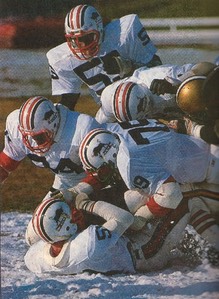
On April 27th the fighting stopped as the two regular seasons began, and both leagues embarked on ambitious league schedules that would last until mid September. In the Budweiser, the London Ravens carried on where they had left off the previous year in the old AFL, winning every game huge scorelines.
The addition of American quarterback Ron Roberts Jnr to their squad help to push their game average beyond 60 points a game (still a regular season record) and the 106-0 drubbing of City of London Stags in week 7 helped them to a season points total of 501 with only 6 against.
The Ravens remained unbeaten all season and turned the Atlantic division of the Budwesier League into a one-horse race. The Central and Channel divisions weren't. Thames Valley, Swindon and Slough were split in a three-way tie atop the Central Division. In the end it was the dark-horse Swindon outfit which emerged as the best of the bunch. However, their championship race ended in the semi-finals when they were comprehensively beaten by the Ravens.
In the Channel Division, the Streatham Olympians eventually beat off their nearest rivals, the Southampton Seahawks, and marched proudly into the playoffs. The Olympians clinched the divisional title holding on to a 28-26 lead in week 9 against Southampton. Greg Hairstone passed for two TD's and Tony Scarlett ran for two more to keep the south coasters at bay.
In the BAFL, the best football was seen in the Central Division where Birmingham Bulls, Leicester Panthers and Nottingham Hoods were neck and neck for the top spot. The Bulls had beaten Leicester in a EuroBowl eliminator before the current season had started, but revenge was on hand later in the spring when the Panthers came from behind to record an impressive victory.
The Hood's Cliff Stroughter, a product of the University of Illinois, was tearing up the record books as the Hoods showed themselves to be a dominant force. Stroughter rushed for over 3,000 yards in the regular season and still holds the UK single season record for yards and TDs. Birmingham eventually clinched the title after avenging the early Leicester loss and halting Stroughter and Co in an action-packed game at Alexander Stadium in July. 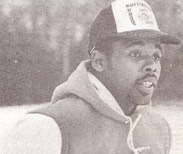
In other playoff games in the Budweiser League, the Plymouth Admirals frightened the lives out of some of the big guns before bowing out gracefully to Northampton in the playoffs and Cardiff Tigers sensationally knocked out the previously impressive Southampton Seahawks. Dunstable too had a chance of glory before going down to Streatham in the quarterfinals.
In the BAFL, little known Luton Flyers, turned over the Manchester Allstars before falling to the other Manchester club, the Spartans. And Fylde Falcons, after a dreadful record in 1985, bounced back to win the Anglo Northern division title. They disposed of Scottish division champs Musselburgh in the first round of the playoffs before meeting the eventual winners, Birmingham.
Birmingham overcame Fylde and Manchester Spartans saw off Luton. Leicester once again came from behind to beat Milton Keynes 27-22, and the Glasgow Lions shattered Nottingham Hoods hopes of a final place with a display of power football that saw them go through by a massive 44-14 scoreline. The game, however, was marred by the ejection of Stroughter who, after an argument with the officials, took the whole team off the field in the middle of the third quarter, never to return.
In the Budweiser semi-finals, the Ravens found little problem shutting out Swindon 43-0, but the Olympians had to wait until the final minutes to seal their second consecutive bowl appearance with a win against the Northamptonshire Stormbringers (coached by Dr Kurt Smeby) at Crystal Palace.
Semi-final day in the BAFL was two weeks later, the same day as Budweiser Bowl I. American Lloyd Queen ran for 160 yards and three TD's to help the Bulls to a convincing 35-7 victory over the Manchester Spartans.
At Glasgow's Hellenvale Park, the Leicester Panthers had travelled north with much expectation to take on the Glasgow Lions. With 27 seconds left on the clock the Panthers led 15-14, and sensed victory. At the two minute warning, the Lions had started a drive at their own 40 yard line and, assisted by a personal foul call, found themselves at the Leicester 22 yard line with just 27 seconds left. Quarterback Mark Federspiel rolled right and fired the ball into the endzone where Mark Thompson made a leaping grab for the go-ahead score.
Leicester made one final attempt to salvage the game when Tony Cope dropped back to make a desperation pass. Before he got the ball away, he was sacked and Glasgow's Davie Yeats was on hand to scoop up the ball and return it to the two-yard line. As time expired, Lion's running back Steve Curry burst through the line to make the final score 27-15.
At the same time at Crystal Palace in London, the London Ravens met the Streatham Olympians in Budweiser Bowl I. This was the second year in the succession that the two London giants met each other in a UK final, and many people had predicted another London Ravens whitewash. The attendance for the game was approximately 5,000, probably because of most people's predictions about the final scoreline.
The Ravens cruised to a comfortable 20-0 half-time lead, thanks to the efforts of Joe St.Louis whose 77 yard scamper opened the day's scoring and a 76 yard TD pass from QB Roberts to Tony Taylor. In the second half though, things then started to change. Andy Smythe and Gerry Anderson made things very interesting as they rushed over for scores to close the gap to 20-12 to the Ravens. This time it was the turn of the Ravens to face the heat. In a stirring last-minute rally, Steve Chesney's despairing dive failed and the Ravens were champions again.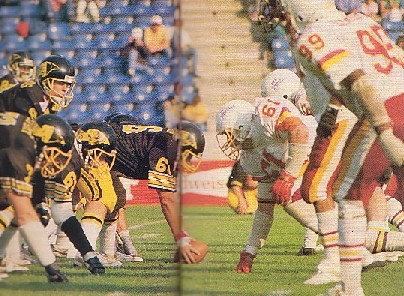
Two weeks later on a soaked Alexander Stadium field, Birmingham Bulls crowned a superb season with a SummerBowl II triumph. The Lions supporters came south hoping for another upset win, but they were to be denied. Lloyd Queen set the tone for the game with an 86 yard kick-off return and three plays later burst over from nine yards out to send the Bulls in front. A third quarter safety was Glasgow's only consolation when a Bull's punt snap sailed straight out of the endzone. Richard Meanwell hit three field goals and Mark Williams ran in on a sweep for the game's only other score. For Bull's Coach Warren Tate it was the end to a great season. The Bulls of Birmingham had at last achieved true first class status. 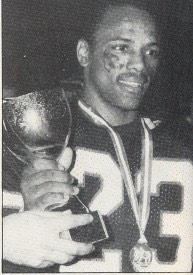
Bulls Lloyd Queen won the MVP award
For the majority of teams in Britain the season was over. But up north, the smaller AAFC was preparing for it's final. The eight team league had successfully negotiated it's second full season as Scunthorpe Steelers met the Wirral Wolves in the final (also known as the Steel Bowl) on October 5th. Pete Burns, John Strachan and Steve Hodgskin scored two TD's each as the superior Steelers won through 50-32.
On the international front, Great Britain entered the European Championships for the first time. GB were paired with the Netherlands in a two-legged affair in November. GB won a tight scrap 9-6 in Birmingham in the first leg, and a late rally in the fourth quarter led to a 24-5 win in Hilversum two weeks later. The Lions therefore progressed to the finals in 1987.
In November the BAFL announced losses of £40,000 and promptly went into liquidation. Within a week, British football was united by default. The Budweiser banner now flew alone as the BAFL teams had no alternative but to join up. The Budweiser League would cover 102 clubs playing in a total of 18 divisions. Only the regional minor leagues would continue alone.
However, more significant than all the UK league developments was the commitment of the NFL to play their first official game at Wembley. The defending SuperBowl champion Chicago Bears and the Dallas Cowboys performed in pouring rain to a capacity audience. The venue could have been sold out at least four times, such was the demand for tickets. That one game can now be seen in retrospect as the first major step towards the development of NFL football on a truly worldwide basis. Click here for a review of this match 21 years on.
As 1986 came to a close there was a first in Britball - 1st ever all-female game: South Coast Sharkettes 30-12 Eastbourne Crusaders in Bognor Regis, November 1986. There were a number of other interesting bits and pieces in 1986, notably:
George Powell (Fylde Falcons) scored a record 9 TD's in a game vs. Crewe Railroaders, June 8th 1986.
Tiggy Bell (Bradford Dolphins) rushed for a record 429 yards in a single game vs. Huskies on 6 July 1986.
Channel 4 featured the Musselburgh Magnums in the documentary about Britball, "Mud and guts" in 1986.
Talking of Musselburgh, they registered the 1st female player in Britball in March 1986, back-up QB Fiona Logan.
April 1986 saw the 1st youth game in Ireland. Dublin Panthers 41-0 Drimnagh Pirates.
1st national football game in Ireland saw the Celts beat Belfast Blitzers 46-7 on 25 May 1986 in the Capital cup 1st leg. In the 2nd leg on 22 June Belfast won by 24-20.
Dublin Celts beat Belfast Blitzers 13-0 in the Jack Daniels Summerbowl final. Celts beat Craigavon Cowboys 20-6 in the semi, Belfast beating Coleraine Chieftains 27-6 in the other.
1st youth kitted game in Scotland, 20th July 1986 at Helenvale. Sadly the two teams and the score are a mystery!
Johnstone Crusaders (BAFL Anglo div) became the 1st kitted team to play 2 league games on the same day on 27 July 1986. In game 1 they lost 14-16 to Musselburgh. In game 2 they beat Clydesdale 14-8.
1st ever game on the Isle of Man. Manx Comets 58-14 Peel Vikings 20 April 1986.
Gridiron Sports sponsored a winter league involving Tamworth Trojans, Boston Blitz, Lincoln Bombers, Charnwood Beacons. The bowl was between Tamworth and Boston, as yet no record of the result has surfaced.
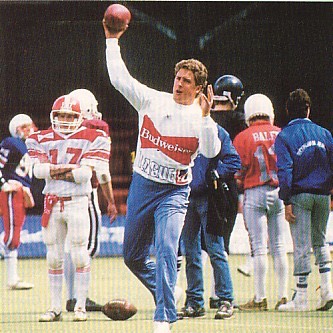
Dan Marino (the legendary Miami Dolphins QB) came to the UK in 1986, and took a training session at Loftus Road.
1987
Highlights of the year:
Budweiser takes over
Ravens win title - again
European disappointment
UK to host Euro Bowl
More teams than ever before were playing the game now in 1987, with 130 teams registered with the various leagues. Now though 102 teams were playing under the Budweiser banner.
A National team, the GB Lions, had been set up, and the BAFA chairman David Gill had been given the job of organising a team in time for the 1987 European Nations Championship qualifer against France in the Spring. The team travelled to Dunkirk and recorded an astonishing 59-2 victory. The second leg at home finished 26-0 in GB's favour. The GB Lions secured a place in that summers finals with a two legged victory over the Netherlands in the second qualifying round. They would travel to Finland in the summer.
In the Budweiser League National Division, the London Ravens continued their dominance with another unbeaten season. In the North, the Manchester Allstars had brought together a number of star American performers that won them a Conference title; the Leicester Panthers finally got the better of the Birmingham Bulls to win the Midlands Conference and the Luton Flyers were the other surprise conference winners.
Manchester Allstars v London Olympians, Bud League 1987
The rest of the Budweiser League was split into a 35 team Premier Division and a 48 team Division One. With three separate division there would be three Budweiser Bowls.
The London Ravens reached Budweiser Bowl II where they faced the Manchester Allstars. The final was eventually won by the Londoners who opened up an immediate 26-0 lead, but the Allstars came charging back with three quick unanswered TD's. It took a pass for a first down on third and twenty by QB Ron Roberts to WR Mark Delaney to quell fears of an upset. The Ravens were eventually happy to settle for a 40-23 win, in a game that was shown in highlights on Channel 4.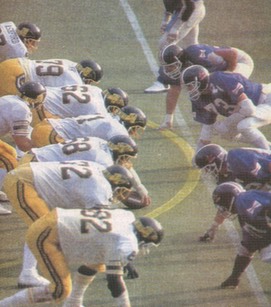
Ravens v Allstars, Bud Bowl II
In the Budweiser Premier Bowl, the Bournemouth Bobcats upset the more-fancied Leeds Cougars who had scored a huge 490 points in the regular season. The Bobcats overwhelemed the Tiggy Bell led Cougars 43-6 with a dominating display of running from Lawrence Dinham and Chalkie Elliott. In Division One, Ashton Oilers actually beat Leeds' regular season tally of points (578) and then beat Ealing Eagles in the bowl game.
In the other league finals, the St.Helens Cardinals won the UKAFL title, the Dundee Whalers took the Thistle Championship and the Mersey Centurions took the BGFL final. The London Area (LA) Panthers won the Capital Bowl.
The GB Lions national team travelled to Finland to take part in the European Nations Championship in Helsinki. They travelled full of confidence following their qualifying wins against France and the Netherlands, but there had been organisational problems. The team travelled without sponsorship, which had failed to be obtained, and the Head Coach Warren Tate resigned at the eleventh hour with Dave Gill joining him one week before the tournament finals. Lance Cone came out of retirement to coach the team - this wasn't ideal preparation. The result was two disappointing losses (to Finland and Italy) and a fourth place finish.
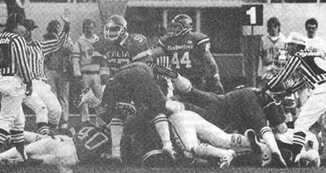 GB Lions v Italy 1987
GB Lions v Italy 1987
In the off-season, Lance Cone took over as chairman of BAFA. The European Football League (EFL) announced that the UK would stage the EuroBowl II championships and NFL Properties immediately pledged cash support. It would be the first time British and European gridiron would be on show to a wide audience as the Channel 4 television network agreed to show extensive coverage of the finals. Having won the Bud Bowl, the London Ravens had qualified for the first time to represent their country at the finals. They had waited four years to show that they were the best at that level.
 BAFRA ref Bill Bowsher
BAFRA ref Bill Bowsher
The London O's took part in the Heineken International tournament in Amsterdam in 1987, and brought the trophy home. They defeated Amsterdam Rams (16-0) and the Berlin Eagles (7-0) enroute to the final, where they defeated Amsterdam Crusaders 9-7.
Other interesting bits and pieces for 1987 included:
Gravesend Lions announced they would play their 1987 home fixtures at Stonebridge Road, Northfleet, the site of the 1st ever game of American football in the UK in 1910.
The Wales American football festival was held on 15 March 1987. The crowd was 13000 making it the largest ever in the principality for Gridiron.
15 May 1987. Washington Presidents QB Jeff Rutter threw for a British record 544 yards and 12 TD passes. Receiver George Skidmore caught 17 for 336 yards and 7 TDs, any one of these could well have been a record. Skidmore also ran a kick off back 99 yards (TD) and also threw a TD pass on an option play when the Presidents thrashed stockport 128-6.
28 June 1987. Tiggy Bell (Leeds) rushed for 429 yards vs. Wrekin equalling his own year-old record. In the process he scored 6 TDs.
28 June 1987. Jeff Rutter (see above) threw 12 of 20 for 182 yards breaking Ron Dubie's 1986 mark of 1505 yards passing.
12 July 1987. Sammy Samuels (Washington) tied the (then) British record of 9 TDs in a game in the wild 66-62 win over Wirral.
19 July 1987. Edinburgh Eagles punter Tom Couch set a British record longest punt of 95 yards vs. Granite City.
26 July 1987. The youngest player (known) to score a TD in senior football was 15 year old David Ford who scored his 10th of the season for Prestatyn Panthers vs. Buckley Hangmen.
30 August 1987. 1st ever youth kitted game in England - Leicester Panthers vs. Durham Chiefs at Saffron lane.
25 Oct 1987. Scotbowl 2 (Scotland's junior kitted championship) Glasgow Lions 24-0 Glasgow Diamonds.

